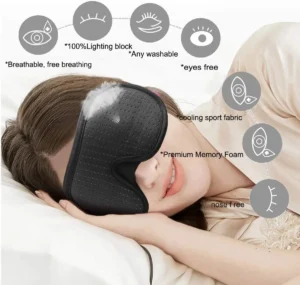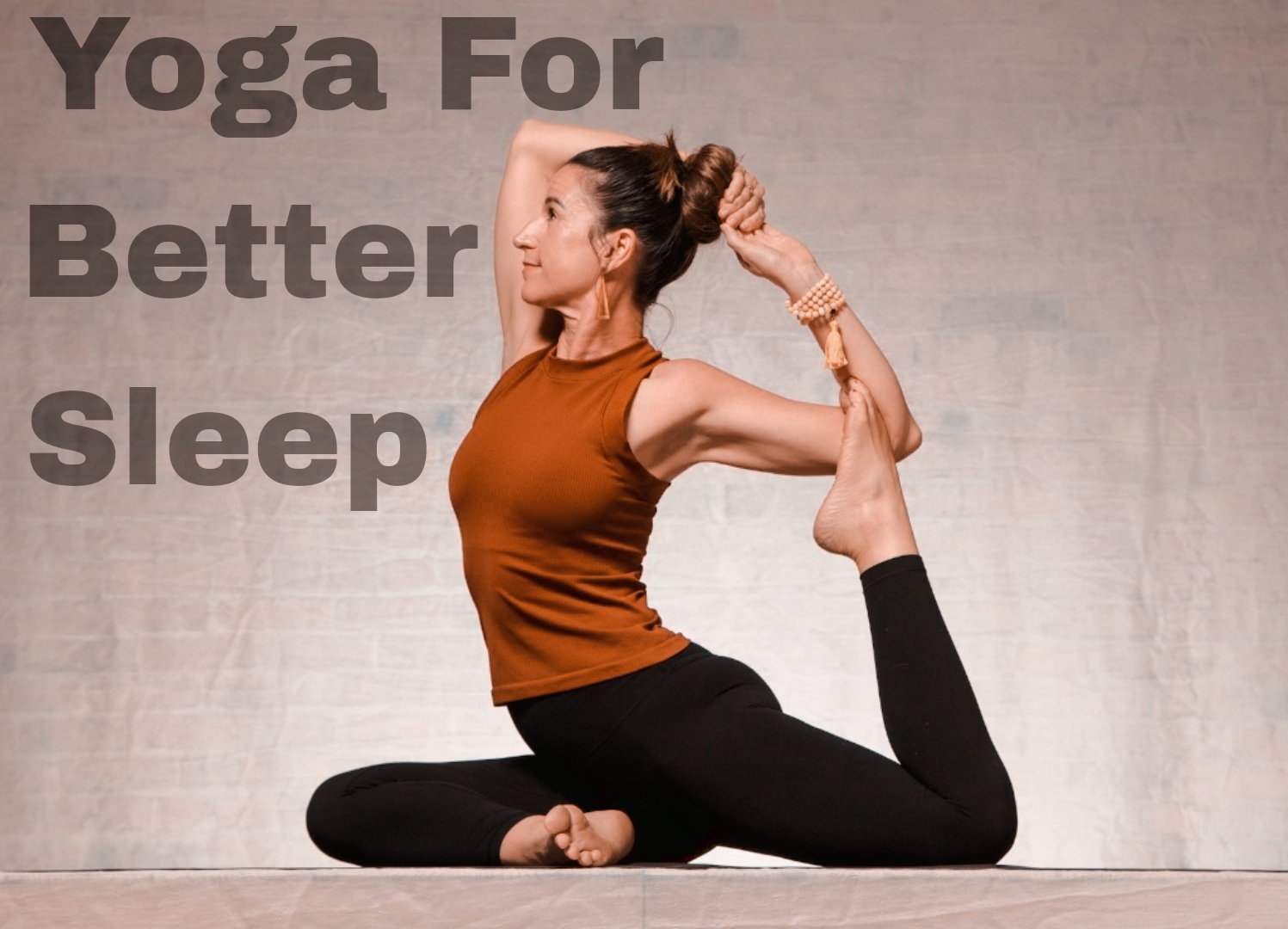Finding Tranquility: How Yoga Enhances Your Sleep Quality
Imagine finishing your day with a gentle yoga session. You dim the lights, roll out your mat, and begin to stretch. Inhale, exhale and feel your worries drift away. Sounds peaceful, right? Well, beyond this immediate sense of calm, yoga can significantly improve your sleep quality and duration. Let’s dive into how this ancient practice can transform your nights from restless to restful.
The Science Behind Yoga and Sleep
When it comes to sleep, yoga works its magic through several mechanisms. First, it reduces stress and anxiety, which are often the culprits behind poor sleep. When you practice yoga, your body produces less cortisol, the stress hormone. Less stress means your mind can settle down more easily at night, leading to improved sleep quality.



Top On Sale Product Recommendations!
3D Mask for Sleep Eye Mask Lights Blockout Soft Padded Sleeping Fabric Cover Shade Blindfold Eyepatch
Now Price: PKR 451.24
Click&Buy: https://s.click.aliexpress.com/e/_omkucuC
Yoga also promotes relaxation through breathing exercises, known as pranayama. By focusing on your breath, you activate your parasympathetic nervous system, which helps your body rest and digest. This shift from the fight-or-flight response to a state of relaxation is crucial for falling asleep quickly and staying asleep longer. So, with regular yoga practice, you’re essentially training your body to relax and prepare for a good night’s sleep.
Creating a Bedtime Yoga Routine
Incorporating yoga into your bedtime routine doesn’t have to be complicated. You don’t need to be a seasoned yogi or spend hours on the mat. Even a short, gentle session can make a big difference. Start with simple poses like Child’s Pose, which stretches your back and calms your mind. Follow this with Legs-Up-The-Wall, a restorative pose that reduces swelling and promotes blood circulation.
Don’t forget to include some deep breathing exercises. This breathing pattern slows your heart rate and relaxes your nervous system, making it easier to drift off to sleep. Combine these poses and breathing exercises into a 10-15 minute routine before bed, and you’ll find yourself unwinding both physically and mentally.
The Power of Consistency
Like any good habit, the benefits of yoga for sleep come with consistency. You can’t expect to see significant improvements after just one session. Instead, aim to incorporate yoga into your daily routine. The more you practice, the more your body will learn to associate yoga with relaxation and sleep.
Think of yoga as your personal sleep training program. Just as athletes train their bodies for peak performance, you’re training your body to sleep better. Over time, you’ll notice that you fall asleep faster, wake up less during the night, and feel more refreshed in the morning. And the best part? You’re doing it naturally, without relying on sleep medications or other interventions.
Personal Success Stories
Don’t just take my word for it—many people have experienced firsthand how yoga can improve sleep. For instance, my friend Sarah used to struggle with insomnia. She’d toss and turn for hours, staring at the ceiling and counting sheep. After incorporating a nightly yoga routine, she noticed a dramatic improvement. Now, she falls asleep within minutes and wakes up feeling more rested than ever.
Another friend, Mike, found that yoga helped him manage his sleep apnea. While it didn’t cure the condition, the relaxation techniques reduced his nighttime awakenings. He combined yoga with his CPAP treatment, and together, these approaches improved his sleep quality immensely. Stories like these highlight the transformative power of yoga, regardless of your sleep challenges.
Yoga’s Broad Appeal
One of the best things about yoga is its accessibility. Yoga meets you where you are and adapts to your needs. There are numerous online resources, apps, and local classes to guide you through sleep-focused routines. So, no matter your schedule or lifestyle, you can find a way to make yoga work for you.
Even if you’re skeptical, give it a try. You might be surprised at how effective a few simple stretches and mindful breathing exercises can be. The benefits extend beyond better sleep—yoga can also improve your overall well-being, reducing stress, increasing flexibility, and boosting your mood. It’s a win-win!
Wrapping Up
In conclusion, yoga offers a gentle, natural way to enhance your sleep quality and duration. By reducing stress, promoting relaxation, and creating consistent bedtime habits, yoga helps train your body and mind to embrace restful sleep. So why not unroll your mat tonight and give it a go? Sweet dreams await!
Yoga is more than just an exercise—it’s a journey towards better health and well-being. And a good night’s sleep is the perfect first step.
Discover the Sleep-Enhancing Power of Yoga
Are you tossing and turning at night, desperately seeking better sleep? Yoga might be your answer! This ancient practice isn’t just for flexibility and relaxation; it can profoundly impact your sleep quality and duration. Let’s dive into how yoga can be your nighttime hero. huskines
Stress Less, Sleep More
That’s stress, my friend, and it’s a major sleep disruptor. Yoga helps by reducing stress levels through mindful breathing and gentle stretches. When you practice yoga, your body releases endorphins—those lovely feel-good hormones. Plus, it lowers cortisol, the stress hormone that keeps you awake. Imagine ending your day with a serene yoga session. You’d slip into a peaceful sleep, stress-free and ready to rest.
Deep Breathing for Deep Sleep
Breathing is something we often take for granted, but how you breathe can influence your sleep. Yoga emphasizes deep, controlled breathing techniques that calm your nervous system. When you focus on your breath, you activate your parasympathetic nervous system, which promotes relaxation and sleep. Try a simple breathing exercise before bed: inhale deeply through your nose for four counts, hold for seven, and exhale through your mouth for eight. This 4-7-8 technique can slow your heart rate and prepare your body for sleep.
Poses to Promote Peaceful Slumber
Not all yoga poses are created equal when it comes to improving sleep. Some poses are specifically designed to help you wind down. Child’s Pose, Legs-Up-The-Wall, and Corpse Pose are fantastic for relaxation. Child’s Pose stretches your back and hips, relieving tension. Legs-Up-The-Wall promotes blood circulation and helps calm your mind. And Corpse Pose, well, it’s all about ultimate relaxation—lying flat on your back, focusing on your breath, and letting go of the day’s worries. Incorporate these poses into your bedtime routine, and you’ll notice a difference in how quickly you fall asleep and the quality of your sleep.
Creating a Nighttime Yoga Routine
You don’t need a long, intense yoga session to improve your sleep. Even a short 10 to 15-minute routine can work wonders. Start with some gentle stretches to release muscle tension, then move into your favorite relaxing poses. Combine these with deep breathing exercises, and you’ve got a powerful recipe for better sleep. Consistency is key, so try to make this part of your nightly ritual. Over time, your body will start to associate these yoga sessions with winding down and preparing for sleep.
Yoga Nidra: The Yoga of Sleep
Have you heard of Yoga Nidra? It’s often called the yoga of sleep, and for good reason. This practice is a form of guided meditation that brings you to a state of deep relaxation. During Yoga Nidra, you lie comfortably while being guided through a series of body scans and visualizations. It’s like a meditation vacation for your mind and body. Studies have shown that Yoga Nidra can improve both the quality and duration of sleep by reducing anxiety and stress. It’s like hitting the reset button on your nervous system, making it easier to drift off into a restful sleep.
The Science Backs It Up
You might be wondering if there’s any scientific proof behind yoga’s sleep benefits. The answer is a resounding yes! Numerous studies have shown that regular yoga practice can improve sleep quality and duration. One study found that participants who practiced yoga daily for eight weeks experienced significant improvements in sleep efficiency and total sleep time. Another study showed that yoga reduced the symptoms of insomnia in patients. With all this scientific backing, it’s clear that yoga isn’t just a feel-good practice—it’s a sleep game-changer.
Final Thoughts
So, if you’re struggling with sleep, why not give yoga a try? It’s a natural, effective way to enhance your sleep quality and duration. Start with some simple poses and breathing exercises, and gradually build a routine that works for you. Remember, the goal is to create a relaxing, stress-free environment that promotes restful sleep. Happy practicing, and here’s to better sleep and brighter mornings!
With consistent practice, you’ll not only sleep better but also wake up feeling refreshed and ready to take on the day. So, roll out your yoga mat, take a deep breath, and prepare for a night of peaceful slumber.
Yoga and the Battle Against Insomnia: Finding Peace in Poses
Have you ever spent hours tossing and turning, staring at the ceiling, begging for sleep? You’re not alone. Millions of people suffer from insomnia, and it can feel like a never-ending struggle. The good news? Yoga might be your secret weapon in the battle against sleepless nights.
Yoga: More Than Just Stretching




Top On Sale Product Recommendations!
Pilates spine corrector stretching Thin back cervical spine Lumbar scoliosis yoga exercise equipment Weight bearing 150kg
Original price: PKR 8255.82; Now price: PKR 4127.91
Click&Buy: https://s.click.aliexpress.com/e/_mLsfbb4
When you think of yoga, you might picture people twisting into pretzel-like shapes. But yoga is much more than that. It’s a holistic practice that combines physical postures, breathing exercises, and meditation to promote overall well-being. And guess what? It’s incredibly effective at reducing insomnia symptoms.
Calming the Mind with Meditation
One of the key components of yoga is meditation. Do you know that feeling when your mind won’t stop racing with thoughts about work, relationships, or just life in general? Meditation helps you hit the pause button on those thoughts. By focusing on your breath and being present in the moment, you can calm your mind and create a sense of inner peace. This mental relaxation can make it easier to fall asleep and stay asleep.
Relaxing the Body with Gentle Stretches
Yoga’s physical postures, or asanas, are designed to stretch and strengthen your muscles. But they also do something magical—they help release tension from your body. After a long day, your muscles can be tight and achy, making it hard to relax. Gentle yoga stretches can ease this tension, preparing your body for a restful night’s sleep.
Breathing Your Way to Better Sleep
Ever notice how your breath gets shallow and quick when you’re stressed? Yoga teaches you to take slow, deep breaths. This type of breathing activates your parasympathetic nervous system, which is responsible for rest and digestion. Deep breathing helps lower your heart rate and blood pressure, putting your body in a state that’s perfect for sleep. It’s like flipping a switch from ‘on’ to ‘off.’
Building a Nightly Routine
Consistency is key when it comes to beating insomnia. By incorporating yoga into your nightly routine, you signal to your body that it’s time to wind down. Start with a few minutes of meditation, follow with gentle stretches, and finish with deep breathing exercises. Over time, your body will start to recognize these cues and begin to relax as soon as you hit the mat.
Poses to Try Before Bed
Not sure where to start? Here are a few yoga poses that are particularly effective at promoting sleep:
1. **Child’s Pose (Balasana)**: This pose gently stretches your back and calms the mind.
2. **Legs Up the Wall (Viparita Karani)**: This restorative pose helps reduce tension in your lower back and legs.
3. **Reclining Bound Angle Pose (Supta Baddha Konasana)**: Opens up the hips and encourages deep relaxation.
The Science Behind Yoga and Sleep
You might be wondering if there’s any real science to back up these claims. The answer is a resounding yes! Multiple studies have shown that yoga can significantly improve sleep quality and reduce symptoms of insomnia. One study found that people who practiced yoga for just eight weeks experienced improvements in sleep efficiency, total sleep time, and the time it took to fall asleep.
Yoga and Stress Reduction
When you’re stressed, your body produces more cortisol, a hormone that can keep you awake. Yoga helps reduce cortisol levels, effectively lowering your stress. It’s like having a natural sleep aid without any of the side effects.
A Practice for Everyone
You might be thinking, “I’m not flexible enough for yoga.” But yoga isn’t about touching your toes or doing a perfect downward dog. There are so many different styles of yoga, from restorative to yin, that there’s something for everyone. Even if you’re a complete beginner, you can start with simple poses and gradually work your way up.
The Joy of a Good Night’s Sleep
That’s the joy of a good night’s sleep, and yoga can help you achieve it. By incorporating yoga into your routine, you’re giving yourself the gift of rest. It’s a simple, effective, and enjoyable way to combat insomnia and improve your overall quality of life.
Take the First Step
So, are you ready to give yoga a try? Roll out your mat, take a deep breath, and start your journey towards better sleep. With patience and practice, you’ll be sleeping like a baby in no time. Sweet dreams!
Incorporating yoga into your life is like adding a sprinkle of magic to your bedtime routine. You deserve restful nights and energetic days, so why not give it a shot? Who knows, you might just find that yoga is the key to unlocking the peaceful sleep you’ve been dreaming of.
Discover the Connection Between Yoga and Sleep
Do you struggle to get a good night’s sleep? You’re not alone! Insomnia affects millions of people worldwide, causing frustration and fatigue. But there’s a natural remedy that might just be the answer to your sleepless nights: yoga. Yes, that ancient practice of stretching, breathing, and meditating can help you find the restful slumber you crave. Let’s dive into how yoga can reduce insomnia symptoms and improve your sleep quality.
Yoga Eases Stress and Calms the Mind
One of the primary causes of insomnia is stress. When your mind is racing with worries and to-do lists, falling asleep can seem impossible. Yoga is known for its stress-busting benefits. Through a combination of mindful movements, deep breathing, and meditation, yoga helps to lower cortisol levels, the hormone associated with stress. When you practice yoga, you teach your body and mind to relax, creating the perfect environment for sleep.
Imagine ending your day with a gentle yoga routine. As you move through poses like Child’s Pose or Legs-Up-the-Wall, you’ll feel your muscles unwind and your mind quiet down. This calming practice prepares you for bed, making it easier to drift off into a peaceful sleep. Plus, deep breathing exercises in yoga increase oxygen flow, promoting relaxation and reducing anxiety.
Yoga Improves Physical Comfort
Physical discomfort can be a significant barrier to a good night’s sleep. Whether it’s back pain, neck stiffness, or general muscle tension, discomfort keeps you tossing and turning all night. Yoga addresses these issues by improving flexibility and strength. Regular yoga practice stretches tight muscles and enhances your body’s alignment, reducing aches and pains that could keep you awake.
Think about those nights when you can’t find a comfortable position. Incorporating yoga into your daily routine can alleviate this discomfort. Poses like Cat-Cow Stretch or Forward Fold target specific muscle groups, easing tension and making your body more comfortable. Over time, you’ll notice less physical discomfort and more restful nights.
Yoga Establishes a Bedtime Routine
Consistency is key when it comes to battling insomnia. Establishing a regular bedtime routine signals to your body that it’s time to wind down and prepare for sleep. Yoga can be a central part of this nightly ritual. By dedicating a few minutes each night to a calming yoga practice, you create a consistent habit that your body will begin to recognize as a cue for sleep.
Picture this: You dim the lights, roll out your yoga mat, and spend 15-20 minutes in gentle stretches and breathing exercises. This routine not only helps to relax your body but also creates a mental association between yoga and sleep. Over time, your mind will start to associate these yoga practices with the end of the day and the onset of sleep, making it easier to fall asleep faster and stay asleep longer.
Yoga Promotes Mindfulness and Reduces Worry
Insomnia often comes with a side of worry. You lie awake at night, thinking about everything you need to do or stressing about things out of your control. Yoga incorporates mindfulness, which teaches you to focus on the present moment. By practicing mindfulness through yoga, you learn to let go of those anxious thoughts and stay grounded in the now.
During yoga, you pay attention to your breath and movements, leaving little room for worries. This practice of being present helps to break the cycle of anxious thoughts that can keep you awake. When you become more mindful, you’re less likely to lie in bed with your mind racing, making it easier to fall into a deep, restorative sleep.
Yoga Enhances Melatonin Production
Melatonin is the hormone that regulates your sleep-wake cycle. Your body naturally produces melatonin, but factors like stress, light exposure, and irregular sleep patterns can disrupt its production. Yoga can help to boost melatonin levels naturally. Practices that involve deep relaxation, such as yoga nidra or meditation, have been shown to increase melatonin production.
Consider adding yoga Nidra to your evening routine. This form of guided meditation brings you into a state of deep relaxation, which promotes the release of melatonin. As you lie in Savasana, listening to the soothing voice of your guide, you’ll feel yourself drifting closer to sleep. With increased melatonin levels, you’ll find it easier to fall asleep and stay asleep through the night.
Easy Yoga Poses to Try Before Bed
Ready to give yoga a try? Here are a few easy poses that are perfect for winding down before bed:
– **Child’s Pose (Balasana):** This gentle stretch helps to release tension in your back and shoulders.
– **Legs-Up-the-Wall (Viparita Karani):** Elevate your legs to promote relaxation and improve circulation.
– **Supine Spinal Twist (Supta Matsyendrasana):** This pose gently stretches your back and helps to release tension.
– **Cat-Cow Stretch (Marjaryasana/Bitilasana):** Flow between these poses to release back tension and promote flexibility.
– **Forward Fold (Uttanasana):** A gentle stretch for your hamstrings and lower back, promoting relaxation.
By incorporating these poses into your nightly routine, you’ll set yourself up for a restful and rejuvenating sleep.
Conclusion
Yoga offers a holistic approach to improving sleep quality and reducing insomnia symptoms. By easing stress, improving physical comfort, establishing a bedtime routine, promoting mindfulness, and enhancing melatonin production, yoga can help you get the restful sleep you need. So, the next time you find yourself staring at the ceiling, unable to sleep, roll out your yoga mat and give these calming practices a try. You might just find that yoga is the secret to sweet dreams and better nights.
